What did Venezuelans vote for and why was it so divisive?
On Sunday, Venezuelans chose members for a constituent assembly.
The convening of the assembly has been controversial, with the opposition denouncing it as an attempt by the government to strengthen its power.
What is a constituent assembly?
 Reuters
ReutersConstituent assemblies, unlike legislative assemblies, are set up for the specific purpose of drafting or adopting a constitution.
They are usually dissolved once they have served their purpose.
In the case of Venezuela, it was convened by President Nicolás Maduro to rewrite the existing constitution, which was drafted and passed in 1999 when his mentor, President Hugo Chávez, was in office.
According to article 347 of the Venezuelan constitution, the constituent power lies with "the people".
Mr Maduro said that he, as the elected president, had the power to convene a constituent assembly. However, critics of the move argued that he should have asked the people in a referendum first whether they backed the creation of such an assembly.

Why did Mr Maduro convene it?
 EPA
EPAThe announcement came as a surprise as Mr Maduro had always praised the 1999 constitution.
The president announced on 1 May, amid anti-government protests, that he would convene the constituent assembly.
Almost 30 people had died in protest-related violence to that point and the president was under pressure to act to defuse the tension.
Mr Maduro argued the constituent assembly would promote "reconciliation and peace", however he did not give details of exactly how rewriting the constitution would achieve such broad aims.
He also said that the constituent assembly would promote dialogue in the polarised country.
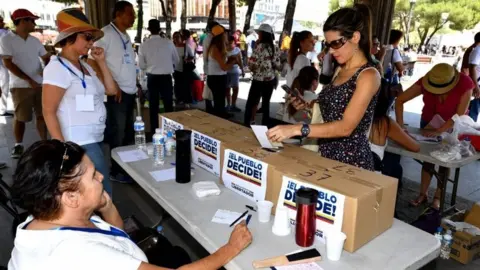 AFP
AFPHowever, the opposition rejected his plans for a constituent assembly and refused to field any candidates or take part in the election.
They also held an unofficial referendum on the assembly on 16 July.
Millions of people in Venezuela as well as those living abroad, went to polling booths set up by the opposition to cast their vote.
The opposition says more than seven million rejected the constituent assembly. The government disputes that figure saying it was not even a third of that.

Why has the opposition rejected the constituent assembly?
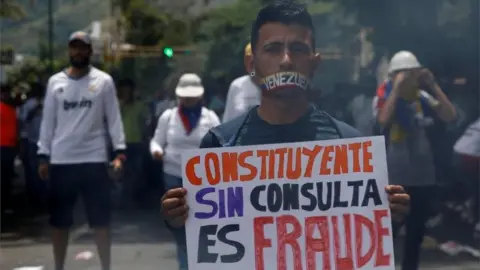 Reuters
ReutersThe opposition objects to the constituent assembly on a number of grounds.
Some Venezuelans, including chief prosecutor Luisa Ortega, argue that the president did not have the power to convene it without consulting the Venezuelan people in a referendum first.
They point to the fact that President Chávez did hold such a referendum when he convened his constituent assembly in 1999.
But their main objection is that they see it as a way by President Maduro to maximise his power and cling on to it for longer.
They argue that the process of drawing up a new constitution will almost certainly mean that regional elections due to be held later this year and presidential polls scheduled for December 2018 will be delayed.

What do Chavistas say?
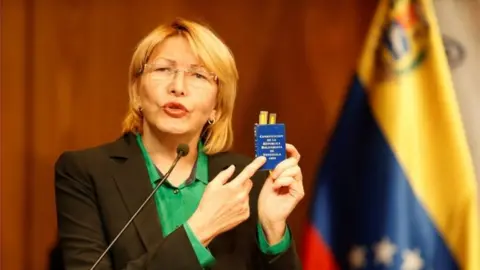 Reuters
ReutersSome Chavistas (supporters of the socialist movement created by President Hugo Chávez and of which Mr Maduro is a part) are opposed to the constituent assembly because they do not want any changes to be made to the existing constitution, which they treasure.
Others back it because they see it as a chance to enshrine some of the social programmes which President Chávez introduced in the constitution so they cannot be abolished even if a new government were to come in.

Who will make up the constituent assembly?
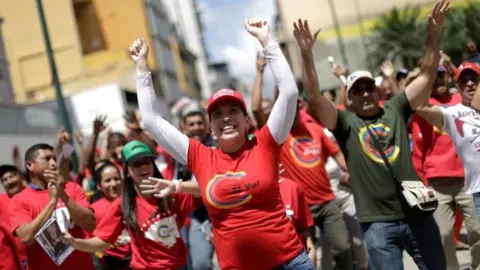 Reuters
ReutersThe constituent assembly will have 545 members. Some critics have already said that the number is too large to allow for meaningful discussions.
The government said the 5,500 candidates who stood came from all walks of life and backgrounds, including workers, women, the elderly and indigenous people.
But as the opposition boycotted the constituent assembly, most of those who ran were government supporters.
Mr Maduro's wife, Cilia Flores, was elected as a representative, as well as the former foreign minister, Delcy Rodriguez, and influential governing party member Diosdado Cabello - both close allies of Mr Maduro.

What powers will it have?
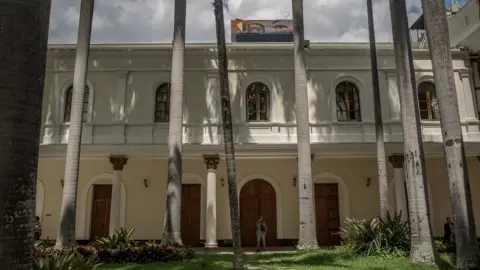 Alejandro Cegarra
Alejandro CegarraAs the constituent assembly will be drawing up a new constitution it has the potential to fundamentally change how Venezuela is run.
The last time a constituent assembly met in 1999, the legislature was suspended while the constitution was debated.
The opposition-controlled National Assembly has already said it will not stand for that.
But it is difficult to predict how it could continue functioning while the laws of the land are being redrawn.

When will the new constitution come into force?
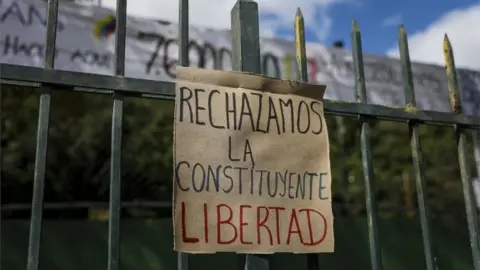 EPA
EPANo time limits have been set, which is why the opposition fears the constituent assembly is a ploy to buy President Maduro more time in office.
A new constitution will have to be approved in a referendum and the government has announced it will hold one once a new constitution has been drafted.
However, the opposition fears that this referendum may never be held or that the changes the constituent assembly makes will be implemented before they are put to a popular vote.
